- Home
- L. M. Montgomery
Magic for Marigold
Magic for Marigold Read online
Copyright © 2011 Heirs of L. M. Montgomery Inc.
Cover and internal design © 2014 by Sourcebooks, Inc.
Cover design by The Book Designers
Cover illustration by Jacqui Oakley, jacquioakley.com
L. M. Montgomery is a trademark of Heirs of L. M. Montgomery Inc.
Sourcebooks and the colophon are registered trademarks of Sourcebooks, Inc.
All rights reserved. No part of this book may be reproduced in any form or by any electronic or mechanical means including information storage and retrieval systems—except in the case of brief quotations embodied in critical articles or reviews—without permission in writing from its publisher, Sourcebooks, Inc.
The characters and events portrayed in this book are fictitious or are used fictitiously. Any similarity to real persons, living or dead, is purely coincidental and not intended by the author.
Published by Sourcebooks Fire, an imprint of Sourcebooks, Inc.
P.O. Box 4410, Naperville, Illinois 60567-4410
(630) 961-3900
Fax: (630) 961-2168
www.sourcebooks.com
Original copyright © 1929 by L. M. Montgomery.
Library of Congress Cataloging-in-Publication data is on file with the publisher.
Contents
Front Cover
Title Page
Copyright
Chapter 1: What’s in a Name?
Chapter 2: Sealed of the Tribe
Chapter 3: April Promise
Chapter 4: Marigold Goes A-Visiting
Chapter 5: The Door That Men Call Death
Chapter 6: The Power of the Dog
Chapter 7: Lost Laughter
Chapter 8: “It”
Chapter 9: A Lesley Christmas
Chapter 10: The Bobbing of Marigold
Chapter 11: A Counsel of Perfection
Chapter 12: Marigold Entertains
Chapter 13: A Ghost Is Laid
Chapter 14: Bitterness of Soul
Chapter 15: One Clear Call
Chapter 16: One of Us
Chapter 17: Not by Bread Alone
Chapter 18: Red Ink or—?
Chapter 19: How It Came to Pass
Chapter 20: The Punishment of Billy
Chapter 21: Her Chrism of Womanhood
About the Author
Back Cover
To Nora,
In memory of a world that has passed away.
CHAPTER 1
What’s in a Name?
1
Once upon a time—which, when you come to think of it, is really the only proper way to begin a story—the only way that really smacks of romance and fairyland—all the Harmony members of the Lesley clan had assembled at Cloud of Spruce to celebrate Old Grandmother’s birthday as usual. Also to name Lorraine’s baby. It was a crying shame, as Aunt Nina pathetically said, that the little darling had been in the world four whole months without a name. But what could you do, with poor dear Leander dying in that terribly sudden way just two weeks before his daughter was born and poor Lorraine being so desperately ill for weeks and weeks afterwards? Not very strong yet, for that matter. And there was tuberculosis in her family, you know.
Aunt Nina was not really an aunt at all—at least, not of any Lesley. She was just a cousin. It was the custom of the Lesley caste to call everyone “Uncle” or “Aunt” as soon as he or she had become too old to be fitly called by a first name among the young fry. There will be no end of these “aunts” and “uncles” bobbing in and out of this story—as well as several genuine ones. I shall not stop to explain which kind they were. It doesn’t matter. They were all Lesleys or married to Lesleys. That was all that mattered. You were born to the purple if you were a Lesley. Even the pedigrees of their cats were known.
All the Lesleys adored Lorraine’s baby. They had all agreed in loving Leander—about the only thing they had ever been known to agree on. And it was thirty years since there had been a baby at Cloud of Spruce. Old Grandmother had more than once said gloomily that the good old stock was running out. So this small lady’s advent would have been hailed with delirious delight if it hadn’t been for Leander’s death and Lorraine’s long illness. Now that Old Grandmother’s birthday had come, the Lesleys had an excuse for their long-deferred jollification. As for the name, no Lesley baby was ever named until every relative within get-at-able distance had had his or her say in the matter. The selection of a suitable name was, in their eyes, a much more important thing than the mere christening. And how much more in the case of a fatherless baby whose mother was a sweet soul enough—but—you know—a Winthrop!
Cloud of Spruce, the original Lesley homestead, where Old Grandmother and Young Grandmother and Mrs. Leander and the baby and Salome Silversides lived, was on the harbor shore, far enough out of Harmony village to be in the real country; a cream brick house—a nice chubby old house—so covered with vines that it looked more like a heap of ivy than a house; a house that had folded its hands and said, “I will rest.” Before it was the beautiful Harmony Harbor; with its purring waves, so close that in autumnal storms the spray dashed over the very doorsteps and encrusted the windows. Behind it was an orchard that climbed the slope. And about it always the soft sighing of the big spruce wood on the hill.
The birthday dinner was eaten in Old Grandmother’s room—which had been the “orchard room” until Old Grandmother, two years back, had cheerfully and calmly announced that she was tired of getting up before breakfast and working between meals.
“I’m going to spend the rest of my life being waited on,” she said. “I’ve had ninety years of slaving for other people”—and bossing them, the Lesleys said in their hearts. But not out loud, for it did really seem at times as if Old Grandmother’s ears could hear for miles. Uncle Ebenezer said something once about Old Grandmother, to himself in his cellar at midnight, when he knew he was the only human being in the house. Next Sunday afternoon Old Grandmother cast it up to him. She said Lucifer had told her. Lucifer was her cat. And Uncle Ebenezer suddenly remembered that his cat had been sitting on the edge of the potato bin when he said that.
It was safest not to say things about Old Grandmother.
Old Grandmother’s room was a long, dim-green apartment running across the south end of the house, with a glass door opening right into the orchard. Its walls were hung with photographs of Lesley brides for sixty years back, most of them with enormous bouquets and wonderful veils and trains. Clementine’s photograph was among them—Clementine, Leander’s first wife, who had died six years ago with her little unnamed daughter. Old Grandmother had it hanging on the wall at the foot of her bed so that she could see it all the time. Old Grandmother had been very fond of Clementine. At least, she always gave Lorraine that impression.
The picture was good to look at—Clementine Lesley had been very beautiful. She was not dressed as a bride—in fact the picture had been taken just before her marriage and had a clan fame as “Clementine with the lily.” She was posed standing with her beautiful arms resting on a pedestal and in one slender, perfect hand—Clementine’s hands had become a tradition of loveliness—she held a lily, at which she was gazing earnestly. Old Grandmother had told Lorraine once that a distinguished guest at Cloud of Spruce, an artist of international fame, had exclaimed on seeing that picture,
“Exquisite hands! Hands into which a man might fearlessly put his soul!”
Lorraine had sighed and looked at her rather thin little hands. Not beautiful—scarcely even pretty; yet Leander had once kissed their finger-tips and said—but Lorraine did not tell Old Grandmother what Leander
had said. Perhaps Old Grandmother might have liked her better if she had.
Old Grandmother had her clock in the corner by the bed—a clock that had struck for the funerals and weddings and goings and comings and meetings and partings of five generations; the grandfather clock her husband’s father had brought out from Scotland a hundred and forty years ago; the Lesleys plumed themselves on being Prince Edward Island pioneer stock. It was still keeping excellent time and Old Grandmother got out of bed every night to wind it. She would have done that if she had been dying.
Her other great treasure was in the opposite corner. A big glass case with Alicia, the famous Skinner doll, in it. Old Grandmother’s mother had been a Skinner and the doll had no part in Lesley traditions, but every Lesley child had been brought up in the fear and awe of it and knew its story. Old Grandmother’s mother’s sister had lost her only little daughter of three years and had never been “quite right” afterwards. She had had a waxen image of her baby made and kept it beside her always and talked to it as if it had been alive. It was dressed in a wonderful embroidered dress that had belonged to the dead baby, and wore one of her slippers. The other slipper was held in one waxen hand ready for the small bare foot that peeped out under the muslin flounces. The doll was so lifelike that Lorraine always shuddered when she passed it, and Salome Silversides was very doubtful of the propriety of having such a thing in the house at all, especially as she knew that Lazarre, the French hired man, thought and told that it was the Old Lady’s “Saint” and believed she prayed before it regularly. But all the Lesleys had a certain pride in it. No other Prince Edward Island family could boast a doll like that. It conferred a certain distinction upon them and tourists wrote it up in their local papers when they went back home.
Of course the cats were present at the festivity also. Lucifer and the Witch of Endor. Both of black velvet with great round eyes. Cloud of Spruce was noted for its breed of black cats with topaz-hued eyes. Its kittens were not scattered broadcast but given away with due discrimination.
Lucifer was Old Grandmother’s favorite. A remote, subtle cat. An inscrutable cat so full of mystery that it fairly oozed out of him. The Witch of Endor became her name but compared to Lucifer she was commonplace. Salome wondered secretly that Old Grandmother wasn’t afraid of a judgment for calling a cat after the Old Harry. Salome “liked cats in their place” but she was furious when Uncle Klon said to her once,
“Salome Silversides! Why, you ought to be a cat yourself with a name like that. A sleek, purring plushy Maltese.”
“I’m sure I don’t look like a cat,” said Salome, highly insulted. And Uncle Klon agreed that she did not.
Old Grandmother was a gnomish dame of ninety-two who meant to live to be a hundred. A tiny, shrunken, wrinkled thing with flashing black eyes. There was a Puckish hint of malice in most things she said or did. She ruled the whole Lesley clan and knew everything that was said and done in it. If she had given up “slaving” she certainly had not given up “bossing.” Today she was propped up on crimson cushions, with a fresh, frilled, white cap tied around her face, eating her dinner heartily and thinking things not lawful to be uttered about her daughters-in-law and her granddaughters-in-law and her great-grand-daughters-in-law.
2
Young Grandmother, a mere lass of sixty-five, sat at the head of the long table—a tall, handsome lady with bright, steel-blue eyes and white hair, whom Old Grandmother thought a somewhat pert young thing. There was nothing of the traditional Grandmother of caps and knitting about her. She was like a stately old princess in her purple velvet gown with its wonderful lace collar. The gown had been made eight years before, but when Young Grandmother wore anything it seemed at once in the height of the fashion. Most of the Lesleys present thought she should not have laid aside her black even for a birthday dinner. But Young Grandmother did not care what they thought any more than Old Grandmother did. She had been a Blaisdell—one of “the stubborn Blaisdells”—and the Blaisdell traditions were as good as the Lesley traditions any day.
Lorraine sat on the right of Young Grandmother at the table, with the baby in her cradle beside her. Because of the baby she had a certain undeniable importance never before conceded her. All the Lesleys had been more or less opposed to Leander’s “second choice.” Only the fact that she was a minister’s daughter appeased them. She was a shy, timid, pretty creature—quite insignificant except for her enormous masses of lustrous, pale gold hair. Her small face was sweet and flower-like and she had peculiarly soft gray-blue eyes with long lashes. She looked very young and fragile in her black dress. But she was beginning to be a little happy once more. Her arms, that had reached out so emptily in the silence of the night, were filled again. The fields and hills around Cloud of Spruce that had been so stark and bare and chill when her little lady came were green and golden now, spilled over with blossoms, and the orchard was an exquisite perfumed world by itself. One could not be altogether unhappy, in springtime, with such a wonderful, unbelievable baby.
The baby lay in the old Heppelwhite cradle where her father and grandfather had lain before her—a quite adorable baby, with a saucy little chin, tiny hands as exquisite as the apple-blossoms, eyes of fairy blue, and the arrogant, superior smile of babies before they have forgotten all the marvelous things they know at first. Lorraine could hardly eat her dinner for gazing at her baby—and wondering. Would this tiny thing ever be a dancing, starry-eyed girl—a white bride—a mother? Lorraine shivered. It did not do to look so far ahead. Aunt Anne got up, brought a shawl, and tenderly put it around Lorraine’s shoulders. Lorraine was almost melted, for the June day was hot, but she wore the shawl all through dinner rather than hurt Aunt Anne’s feelings. That one fact described Lorraine.
On Young Grandmother’s left sat Uncle Klondike, the one handsome, mysterious, unaccountable member of the Lesley clan, with his straight, heavy eyebrows, his flashing blue eyes, his mane of tawny hair and the red-gold beard which had caused a sentimental Harmony lady of uncertain years to say that he made her think of those splendid old Vikings.
Uncle Klondike’s real name was Horace, but ever since he had come back from the Yukon with gold dropping out of his pockets he had been known as Klondike Lesley. His deity was the God of All Wanderers and in his service Horace Lesley had spent wild, splendid, adventurous years.
When Klondike had been a boy at school he had a habit of looking at certain places on the map and saying, “I’ll go there.” Go he did. He had stood on the southernmost boulder of Ceylon and sat on Buddhist cairns at the edge of Tibet. The Southern Cross was a pal and he had heard the songs of nightingales in the gardens of the Alhambra. India and the China seas were to him as a tale that is told, and he had walked alone in great Arctic spaces under northern lights. He had lived in many places but he had never thought of any of them as home. That name had all unconsciously been kept sacred to the long, green, seaward-looking glen where he had been born.
And finally he had come home, sated, to live the rest of his life a decent law-abiding clansman, whereof the conclusive sign and token was that he had trimmed his mustache and beard into decency. The mustache had been particularly atrocious. Its ends hung down nearly as far as his beard did. When Aunt Anne asked him despairingly why upon earth he wore a mustache like that he retorted that he wrapped it round his ears to keep them warm. The clan were horribly afraid he meant to go on wearing them—for Uncle Klon was both Lesley and Blaisdell. He finally had them clipped, though he could never be induced to go the length of a clean-shaven face, fashion or no fashion. But, though he went to bed early at least once a week, he still savored life with gusto and the clan were always secretly much afraid of him and his satiric winks and cynical speeches. Aunt Nina, in particular, had held him in terror ever since the day she had told him proudly that her husband had never lied to her.
“Oh, you poor woman,” said Uncle Klon, with real sympathy in his tone.
Nina supposed th
ere was a joke somewhere but she could never find it. She was a W. C. T. U. and an I. O. D. E. and most of the other letters of the alphabet—but somehow she found it hard to get the hang of Klondike’s jokes.
Klondike Lesley was known to be a woman-hater. He scoffed openly at all love, more especially the supreme absurdity of love at first sight. This did not prevent his clan from trying for years to marry him off. It would be the making of Klondike if he had a good wife who would stand no nonsense. They were very obvious about it, and with the renowned Lesley frankness, recommended several excellent brides to him. But Klondike Lesley was notoriously hard to please.
“Catherine Nichols?”
“But look at the thick ankles of her.”
“Emma Goodfellow?”
“Her mother used to call out ‘meow’ in church whenever the minister said something she didn’t like. Can’t risk heredity.”
“Rose Osborn?”
“I can’t stand a woman with pudgy hands.”
“Sara Jennet?”
“An egg without salt.”
“Lottie Parks?”
“I’d like her as a flavoring, not as a dish.”
“Ruth Russell?”—triumphantly, as having at last hit on a woman with whom no reasonable man could find fault.
“Too peculiar. When she has nothing to say she doesn’t talk. That’s really too uncanny in a woman, you know.”
“Dorothy Porter?”
“Ornamental by candlelight. But I don’t believe she’d look so well at breakfast.”
“Amy Ray?”
“Always purring, blinking, sidling, clawing. Nice small pussy-cat but I’m no mouse.”
“Agnes Barr?”
“A woman who says Coué’s formula instead of her prayers!”
“Olive Purdy?”
“Tongue—temper—and tears. Go sparingly, thank you.”
Even Old Grandmother took a hand and met with no better success. She was wiser than to throw any one girl at his head—the men of the Lesley clan never had married the women picked out for them. But she had her own way of managing things.

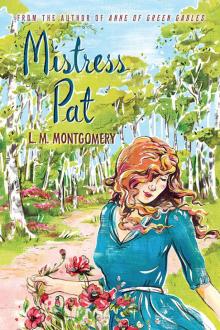 Mistress Pat
Mistress Pat A Tangled Web
A Tangled Web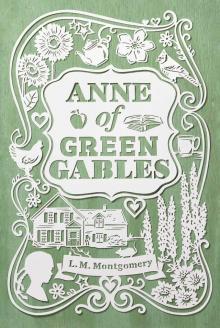 Anne of Green Gables
Anne of Green Gables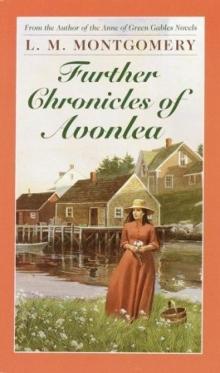 Further Chronicles of Avonlea
Further Chronicles of Avonlea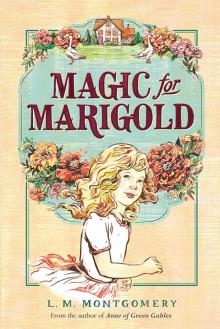 Magic for Marigold
Magic for Marigold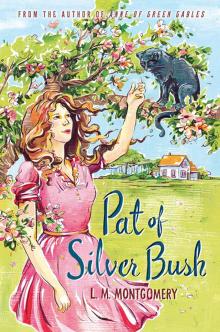 Pat of Silver Bush
Pat of Silver Bush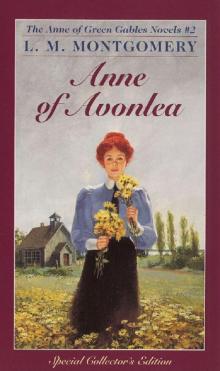 Anne of Avonlea
Anne of Avonlea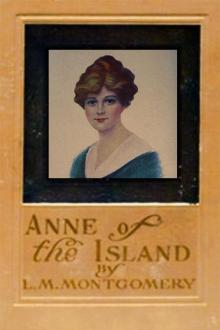 Anne of the Island
Anne of the Island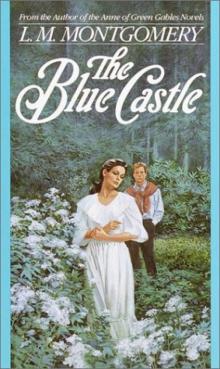 The Blue Castle
The Blue Castle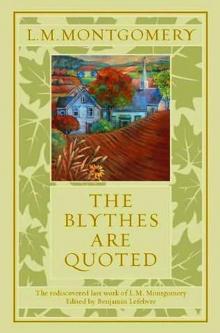 The Blythes Are Quoted
The Blythes Are Quoted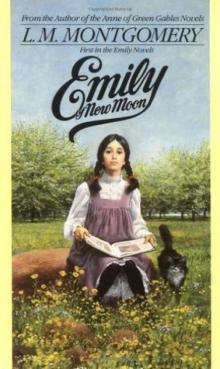 Emily of New Moon
Emily of New Moon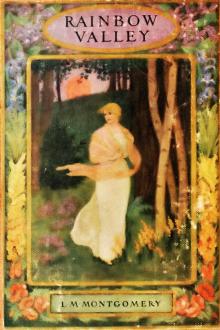 Rainbow Valley
Rainbow Valley Rilla of Ingleside
Rilla of Ingleside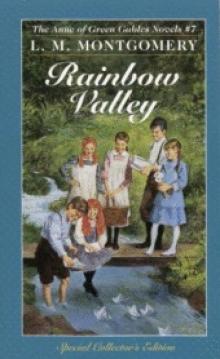 07 - Rainbow Valley
07 - Rainbow Valley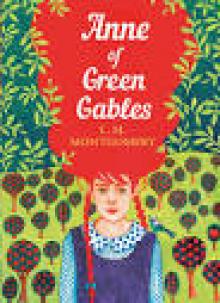 Anne of Green Gables (Penguin)
Anne of Green Gables (Penguin) Emily Climbs
Emily Climbs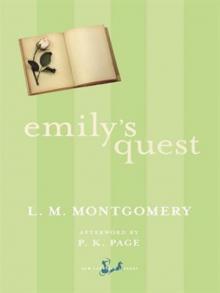 Emily's Quest
Emily's Quest A Name for Herself
A Name for Herself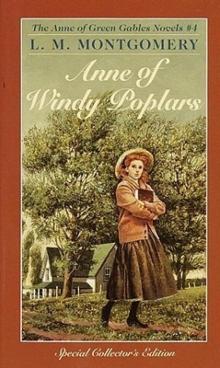 Anne of Windy Poplars
Anne of Windy Poplars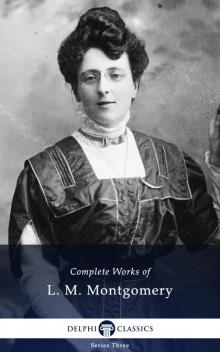 The Complete Works of L M Montgomery
The Complete Works of L M Montgomery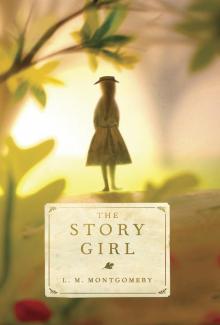 The Story Girl
The Story Girl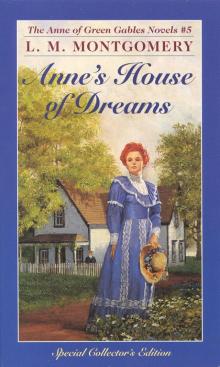 Anne's House of Dreams
Anne's House of Dreams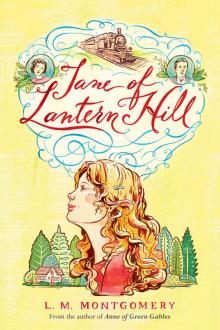 Jane of Lantern Hill
Jane of Lantern Hill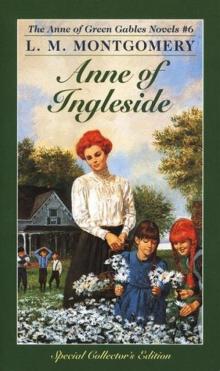 Anne of Ingleside
Anne of Ingleside